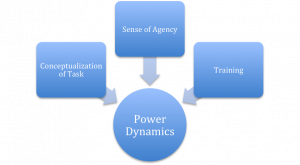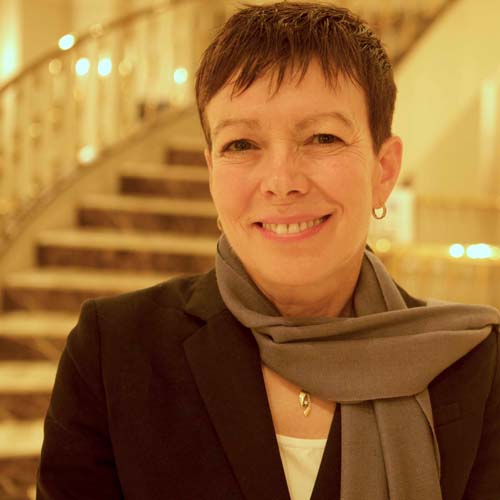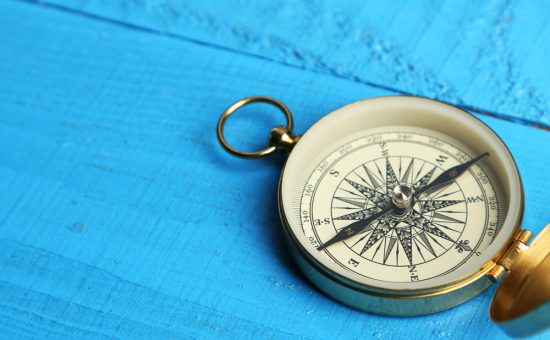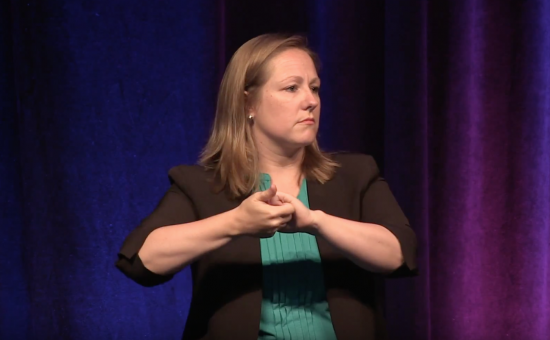Debra Russell | Sign Language Interpreters: Discover & Recover an Enduring Legacy
Debra Russell highlights the legacies of key leaders in the development of the interpreting profession, considering what we may have lost and what we stand to gain by emulating their traits.
You can find the PPT deck for her presentation here.
Gratitude
I am from Canada and we have a way of opening a meeting, which is to thank and recognize that we are standing on ground previously owned by the Aboriginal people. I also want to open this talk by thanking and recognizing the Deaf community, who taught me their language, culture and their experience of seeing the world. So thank you to my local Deaf community and the communities across Canada. I am fortunate, as I have the opportunity to travel widely in Canada and throughout the world, which means many Deaf communities have taught me, while sharing their experiences with me. Thank you to the CODAs, many of you in this room have taught me about your life experience, and I thank each of you. We have one CODA here today from Canada, Janice, thank you for sharing your insights and helping me envision what each of us can do. I never attended or graduated from an interpreter training program – the Deaf community taught me how to interpret, and they still do teach me, helping me understand how to match what they expect, prefer, and want to have happen with interpreters from their point of view. Based on that experience, I share this talk.
Importance of Looking Back
Now, my topic is about understanding our legacies and why it is crucial to look back. If we don’t understand our histories, we are destined to continue to make errors, and lose our way. I think it is important to look back and identify those who lead us, taught us, and ask if we need to find ways to embrace their teachings in a healthy way. Understand that I have been given twenty minutes, which means it is impossible to recognize all of the leaders that have contributed at the local, state or provincial, or national or international levels. So I have chosen some key people – people who have taught me and key people who have contributed greatly to our profession, and some that are still contributing. You may look at the list today and point out those I have not mentioned – to those people, I thank them for their contributions and hope they will accept my apologies for not including them today.
As I began the research for this presentation, I thought it was important to uncover the stories, the many positive stories that we can continue to learn from. For example, we can learn about our successes, and how we define success. If we forget those stories then we ultimately block our future success. It can prevent us from setting goals, and making progress on those goals that can result in improving our profession. So today is a chance to look back and see what those people contributed to our field and what we must learn from their legacy.
A legacy can be defined as our history, and also how we remember a person, or what we pass on to others. A legacy can be positive or negative – it is for you to decide.
Lilian Beard
I start with Lilian Beard. As I look out at the audience, as soon as Lilian’s photo came up, you immediately smiled. Why? How do we remember Lilian? Many of you never had the chance to meet her, but we have a collective memory of her many contributions to our field. How many of you remember her from 2009 at RID in Philadelphia, regaling us with story after story and everyone in the audience being captivated by her. Her contributions are numerous. This quote speaks volumes:
“…our friendship (with Deaf people) was never affected because they knew I was always there to support them.”
She was a CODA and this quote speaks to her relationship with the Deaf community, how she was always there to support the Deaf community. My question is this: are we still supporting Deaf people in the same way? If Lilian were here today, what advice would she offer us? How would she guide us in solving problems? Remember what she said when she started the Texas chapter – she began by talking with Deaf people, with, not talking to, not talking about, but talking with Deaf people. She was a wise woman and that sage advice still is true for us today.
As I remember Lilian, I am struck by the following characteristics: humble – she was indeed 100% humble, and she was collaborative, with interpreters, Deaf people and people who were not involved in the Deaf community. Her big heart was open to everyone. I think she had a Deaf heart – well before we began talking about what it means to have a Deaf heart – she demonstrated what it meant. She also knew the value of recognizing and thanking people for their contributions. She did so much, but one key event was her role in creating the Texas Registry of Interpreters. She admitted that she didn’t know how to create an organization so she found someone who knew how to do that and engaged their support.
“I did not do it myself, but I found someone who knew how to create the registry…”
“I think my strong suit was giving acknowledgement to people in the right proportions…”
This is similar to what Anna Witter-Merithew mentioned on Friday night at this conference – each of us must find allies, collaborators, and supporters in order to be successful. As I said, Lilian’s strength was to recognize and thank others for their service and contributions. I wonder, if we were take a good look at ourselves now, does our profession currently recognize the contributions of others? Or, are we so busy complaining, that we are forgetting to recognize and thank people? Lilian was a founding member of RID in 1964, which is well before some of you here were born! As a founding member, what was her vision for the organization? Maybe our organization has gone through many changes, however one of the original visions was to build the organization with Deaf people, and that Deaf people would remain integral in the organization.
Lou Fant
Lou Fant – same response as when you looked at Lilian’s photo. We all remember him with such fondness and affection. Let’s look at some of Lou’s characteristics, and there are many of note! For me, Lou was a pioneer. He forged a way for us, leading us without us knowing he was leading us! He was also a CODA, and also very humble. He had a Deaf heart, and for me, he was a teacher, and a builder – a builder of organizations and a people-builder. He constantly encouraged us to improve as individuals and as organizations. Those traits are all things that we should value and strive to emulate. I went back and re-read Lou’s obituary and this line so resonated with me: “Lou Fant heard the Deaf with his heart.” That line says it all. Lou listened to the Deaf community with his heart, which says everything to me. Lou, like Lilian, was a CODA and he loved sign language. As I recall Lou, he stressed that we must treasure American Sign Language – and not the version of ASL that many of us as interpreters use, but the way Deaf people use their language! His first book, AMESLAN, is a book I still have on my shelf. It is also very interesting for me to see that some Deaf leaders and teachers throughout Canada and the US are talking about their community as an Ameslan community, not as a Deaf community, but rather an Ameslan community. Lou gave generously of his time to create organizations like RID, CIT, the National Theatre of the Deaf, and the list of contributions and successes goes on. Despite his long legacy, Lou never boasted of his involvement in our field.
1. RID certification – reasonable alternative to contract with an agency that specialized in devising, administering and scoring examinations…
2. Two important benefits to us:
– RID no vested interest, certification on more objective footing
– Home office staff and local affiliate personnel would be freed up to attend to what ought to be the main business of RID, fostering the professional growth in all of us…
Sometimes I wonder what Lou would advise us to do about our current challenges with certification. While his book, Silver Threads, is over 25 years old, I think his comments then about certification are food for thought for us today. We are still debating certification all these years later, but Lou’s idea was to take certification out of our organization and put it into the hands of an organization that specializes in assessment. Doing so would leave the RID staff with the time to focus on the business of RID: to promote the development and growth of our profession. Interesting, isn’t it?
Anna Witter-Merithew
Many people have contributed to the development of our profession, and throughout that process there were others that also recognized the value of creating an organization for interpreter educators. I know that many were involved in that movement; however, I have chosen Anna Witter-Merithew, who is with us today. I could use the whole 20 minutes to talk about Anna’s contributions, but the point is this: she has been actively involved in RID, serving multiple terms as President and Vice-President. She has served as the President of CIT twice. She has developed curriculum for teaching interpreters, she has created interpreter education programs, and more recently we note her work in the area of ethics and decision-making. She is nothing short of an amazing leader and an amazing contributor.
MJ Bienvenu
Let’s look at MJ Bienvenu, who is still so actively involved. As I look back on my 30 years in the field, MJ has been present everywhere – RID, CIT, and more! MJ is one who deeply understands the Deaf experience, equality and what it means to meaningfully include Deaf people in a movement. How would we define her? I think as an activist, an activist with the goal of equality.
“It’s about… Love for justice and equality for all. Love for basic human rights. Love for civil rights for all people…”
–Nov 7, 2012 Planet Deaf Queer
Many of you will have studied the “green books,” so you know her face, or remember her involvement in the Deaf President Now movement. She was also the co-founder of the TBC during 1997. That organization was the first organization to bring interpreters and Deaf people together to have conversations about power, and what was happening between the sign language interpreting and Deaf communities. She is a phenomenal leader!
Betty Colonomos
As our field developed and we saw the emergence of many interpreting businesses, others questioned whether a business model was what was most effective for our field. Betty Colonomos was one of those people, and she found a way to create a business that also valued and embedded Deaf culture into every aspect of the business. Again, we can see that Betty has persisted in contributing to the community, and after 30 plus years, she is continuing to write, present, teach, and encourage us to reflect deeply. Her interpreting model is one that is taught daily in programs across this country. Her work with the Etna group is teaching the next generation to be reflective practitioners. Her contributions are countless.
Ed Bosson
Another example of someone who has contributed hugely to our field is Ed Bosson. Ed is known as the “father of VRS,” and there is no doubt that technology has dramatically changed our profession. We need to thank Ed for his vision of what equal communication access for Deaf people could be. He has impacted each of us.
Have We Lost Our Way?
But sometimes I wonder, like Shane Feldman said this weekend, if its like driving a car aimlessly – and sometimes we simply are lost. Have we lost some of those key characteristics that our previous leaders so generously modeled for us? Now we see more and more interpreters obsessing about the financial aspects of being interpreters, and not thinking about contributing. We also see tensions among our colleagues, and camps that have emerged. Yesterday, Nancy Blanchard spoke of the tension between the concepts of business and service. Is business the primary driver, or is service? Additionally, our relationship with the Deaf community appears to be fading, and our relationship with each other as colleagues is changing.
Recovery
Can we recover some of those traits? My answer is a resounding yes! As we have heard yesterday and today, one of the first things we can do to recover as a profession is to regain our relationship with the Deaf community, in meaningful ways, not just to discuss business practices but to connect to the heart of the community. Another action we can all take is to commit to leadership with integrity, leadership with honesty. We can also all commit to everyday doing something that will improve our community. We sometimes speak of wanting to change the world, change our organizations, and change the field. But let’s shift that attention inward, where maybe we have to start changing ourselves first. We can take action that will result in positive change, and everyday that requires us to do something with the possibilities in front of us. You can take actions such as acting as an ally, which requires that you continue to have hope.
 This next slide comes from some research that my friend and colleague Risa Shaw and I are doing related to power and legal interpreting. I think the model is relevant to this conversation. We need to explore what it is we envision when we talk about the task of interpreting. Do we see interpreting as merely the act of relaying words and signs, and see ourselves as passive? Or, do we see interpreting as something that requires us to be actively involved in the Deaf community, supporting Deaf people, and looking carefully at our decisions and actions that can oppress Deaf people? The model shows a “sense of agency,” which speaks to the inner control where we have to take responsibility for the work, for our profession, and ultimately for each other. It’s a huge discussion. And finally, the model addresses training. How are we teaching interpreters? I am an interpreter educator and I am nervous about how we teach interpreters now. All three of the circles on the slide feed into the area of “power” and that’s been our discussion this weekend. How do we share power? How do we recognize our power and acknowledge the impact of negative power? I think if we explore these areas in depth we can recover, as a field.
This next slide comes from some research that my friend and colleague Risa Shaw and I are doing related to power and legal interpreting. I think the model is relevant to this conversation. We need to explore what it is we envision when we talk about the task of interpreting. Do we see interpreting as merely the act of relaying words and signs, and see ourselves as passive? Or, do we see interpreting as something that requires us to be actively involved in the Deaf community, supporting Deaf people, and looking carefully at our decisions and actions that can oppress Deaf people? The model shows a “sense of agency,” which speaks to the inner control where we have to take responsibility for the work, for our profession, and ultimately for each other. It’s a huge discussion. And finally, the model addresses training. How are we teaching interpreters? I am an interpreter educator and I am nervous about how we teach interpreters now. All three of the circles on the slide feed into the area of “power” and that’s been our discussion this weekend. How do we share power? How do we recognize our power and acknowledge the impact of negative power? I think if we explore these areas in depth we can recover, as a field.
“I have felt several emotions as I wrote this book: joy, dismay, excitement, anger, and hope… Joy because of how much we have accomplished; anger at our inability to make decisions… and hope for our success. The one emotion I did not, nor do not feel, is despair…” P. 89
The above quote is from Lou’s book, where he talks about the many emotions that surfaced during the writing process, and Lou stressed that never once did he feel despair, which represents his ability to maintain hope as an ally. I think each of us here at StreetLeverage – Live | Atlanta feels that same sense of hope – I know that I very much feel that sense of hope from this event, and feel hope from each of you.
Connect and Collaborate
6 Steps to Becoming an Ally – Heather Bishop (2002)
1. Understand roots of oppression
2. Understand different oppressions – similarities & differences
3. Consciousness & healing
4. Working for own liberation
5. Becoming an Ally
6. Maintaining Hope
Sometimes our students learn this material from Bishop, from her book entitled “Becoming an Ally.” I appreciated Anna’s comments yesterday about the stages of “becoming,” and while we may not be there yet, we are “becoming.” So, we are learning all over again how to connect and collaborate, and thus how to become an ally. Bishop’s last three steps talk about healing and consciousness raising, and that certainly has been our focus this weekend. When we look at the step, “becoming an ally,” we need to ask what does that look like from the Deaf community’s point of view, and what does it mean for interpreters, and CODAs? That will require a great deal of conversation and dialogue. The final step of maintaining hope is our job!
Your Legacy
What lies ahead is an opportunity for us to uncover, discover, and recover the gifts from our previous leaders’ many contributions, and to look at how we can emulate their traits in our actions. As a graduate of WADS University – remember that is Lou’s phrase, “Watch and Do the Same,” I graduated from that university – I watched our leaders and found ways to copy their actions and that is where we can find hope! So now I ask each of you to think about what your legacy will be for this field. You have an opportunity to change yourself and change the field.
What will your contribution be?
Thank you.













